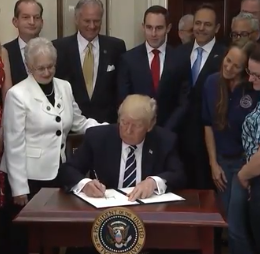President Trump Is Pushing More Apprenticeships, Even as He Looks to Cut Other Job Training

June 15th, 2017
President Donald Trump signed an Executive Order that called for expanding apprenticeships to improve worker training in the United States Thursday. But his own proposed budget would cut other job training programs that advocates say are necessary for this one to thrive.
Trump’s Executive Order mandates that the Department of Labor review current federal workforce programs, charging the Labor Secretary Alexander Acosta, with developing a program that enables private sector businesses and trade associations to develop their own apprenticeships. The order will also create a task force to recommend methods of implementation.
“We will be removing federal restrictions that have prevented different industries from creating these programs,” Trump said at the signing Thursday.
Apprenticeship programs are generally praised on both sides of the aisle. The White House worked with Virginia Democratic Rep. Bobby Scott on the initiative, highlighting it as a “truly bipartisan issue.” Bipartisan legislation was also introduced in the House to strengthen the Perkins Act, which provides federal support for technical education by modernizing it for the 21st century, a bill Ivanka Trump praised on Fox and Friends earlier in the week.
But Trump’s 2018 budget — which Congress is unlikely to pass in full form — would reduce funding for job training programs under the Workforce Innovation and Opportunity Act, which President Barack Obama signed into law in 2014, by 39%, shifting the majority of responsibility of states and employers.
“Around the country, but especially in hard-hit areas in the Rust Belt, federal training and employment services are a powerful way to provide economic opportunities to millions of unemployed and underemployed adults and young people,” Chris Lu, who served as U.S. Deputy Secretary of Labor during the Obama Administration, wrote in TIME this week.
And both employers and economists agree with the White House that the skills gap — the discrepancy between the number of workers available to do the work and the skills required for the job — is something the country needs to address. The White House noted that there are currently six million job vacancies in the United States, the highest number in nearly 40 years, but workers don’t necessarily have the skills to fill them.
The initiative Trump focused on Thursday would double the funds for the Apprenticeship USA program, bringing the total spending to $200 million a year. Nevertheless, advocates worry it won’t come to fruition if the White House’s proposed budget is implemented in Congress.
“The Apprenticeship expansion would not have a negative impact,” said Maria Flynn, President and CEO of Jobs for the Future, who said she has had informal conversations with the White House about this initiative. ” The hurt comes if the proposed [budget] cuts are enacted because that would take a toll on lower skilled lower income young people and adults.”
Scott, who the White House cited as the Congressional Democrat who worked on the initiative, affirmed the bipartisan support for expanding apprenticeships, but said in a conference call with reporters that the proposed budget cuts are detrimental, and funding should be increased. Scott would not answer explicitly when asked if he supported the executive order, saying accountability is paramount. “We need to make sure the programs under the executive order can be measured for quality,” he said. “The key is accountability.”
A senior Administration official noted during the briefing that the government is channeling billions of dollars into job training programs — in fiscal year 2017 spending on these programs totaled $16.7 billion before Pell grants — that he says have not effectively helped the American worker.
But the White House did not respond to additional questions about squaring the possible budget cuts with the expansion of this program.
Illinois Democratic Rep. Raja Krishnamoorthi, who, introduced the revised version of the Perkins Act along with Pennsylvania Republican Rep. Glenn Thompson said that he is “heartened” by the Administration’s attempt to strengthen apprenticeship programs, although he did not work with the White House on the initiative.
But, he noted, the President’s proposed budget would cut funding for the career, technical and adult education training under the Perkins Act by 13%. If those cuts are implemented, he doesn’t think increasing participation from private businesses will close that gap.”Private companies wont replace federal funding,” Krishnamoorthi told Fortune. “All actors have to have skin in the game. It can’t be put completely on the backs of small businesses, it has to be something where all the entities share in the burden.”
Author: Alana Abramson
Original Article
